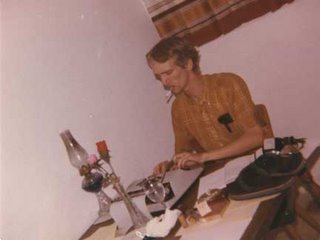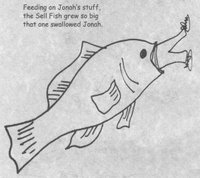1975 – 1985When I had the idea for this project, I didn't realize how much could happen in just ten years. So, for today's entry, I'm going to do something different. A brief overview of the highlights, then a letter I wrote about one of the signal events of the period.
I graduated high school in '75. Knocked around the house through the summer. Padre had been laid off from Western Electric, and had begun his descent into serious depression. My stepmother, WL, couldn't stand to watch him try to will himself to death, and moved out that fall. I decided to go to college not long after.
WL died of a heart attack in November. Rumor has it, they were working on a reconciliation shortly before. Padre didn't recover from that loss, and continued on his plan of death by ennui (he died in '92).
College is marked by roomies and self medication. I've said many times that I majored in Mind-Altering Substances. Primarily alcohol and pot, but also (as we'll see) I became an acid head for too long a period. I was also a speed freak for a summer during this decade, and snorted coke once.
No needles, for what that's worth. I'd had one too many operations to enjoy having things stuck in me.
I lived in the dorms for two years. Lived with Ron for a little over a year. After another season in the dorms, Dana (the future
Dr O) and I lived together. Then the apartment on Santa Fe & Symnes, by which point I was working full time at the Infernal Bookstore. Then Dale, in the
Green House. Then the old house broken into apartments, the one I mentioned in yesterday's entry.
Whew! Ten years in four paragraphs. And just the high points. Sort of.

This letter is dated 17.Oct.1981. It was written during the period I lived with the future
Dr. O.
Jano:
How to tell you about the Darkness? Now it seems unbelievable, improbable. But it was real; it was no flight of fancy.
It began in August of 1978, when I returned from my summer flight in Princeton. I was experiencing a form of culture shock common to local travelers who go anyplace more exotic or culturally sophisticated than Oklahoma. In brief, I could not believe I'd gone to a place so wonderful only to return here, to the hubcap of the universe.
I was also suffering from guilt for an emotionally tragic love affair I had while in Princeton. 'Twas a foolish fling, with a high school senior three years my junior. Ah, well. Now she's in Scotland, I hear, and doing well.
I was also looking a life crisis in the face. I'm sure you know the name of that tune: "Where have we been? Where are we now? Where are we going?"
All this was of a piece, as we say. And it was manifested in the form of many nights of really
serious drinking. Also two LSD weekends....
This brings us to the spring of 1979, through which the above symptoms persisted. Susan [my girlfriend] was attending OU, and we were dating again. Briefly.
For lo, it was to be that the night we wished to spend lovingly entwined — my roommate was fast asleep. Very frustrating, as I'm sure you understand.
And yea verily, Susan did take an interest in my best friend, Chuck. And it came to pass that she spent more time with him than with me. And I was jealous. And Susan broke up with me.
None of this, we may be sure, was any of Chuck's doing. Susan had the hots for him, but she turned him off, physically. "She's too fat," he said. [ed: Chuck was also gay]
Meanwhile, Susan was not the only girl who felt unrequited love for Chuck. There was another, named Louise K.
Now Louise may seem at this point a peripheral character in our little drama, but she is actually quite important. Indeed, it is she who brings the action to a climax.
Therefore, it is fitting that we should know the following things about her:
- She already knew me through Ron, a former roomie of mine for whom she also felt unrequited love.
- Her father was a heavy drinker. So she did not approve of drinking — especially Chuck's and mine.
- At this time, she had an uterine infection which Goddard [the campus clinic] had misdiagnosed.... The infection cause some pain, I believe, and she had at least two or three prescriptions which were intended to overcome the infection and/or pain.
And it came to pass, one May Sunday night, that she would receive an obscene phone call. Or that she sincerely believed she received an obscene phone call, and that it was from your correspondent.
The content of this call, as it was later related to me, was extremely unpleasant. It involved Louise's rape (by me) and Chuck's murder (ditto). And in her mind's eye, Louise saw a Hyde-like man beast with long talons and distorted features. "Succubus," she was to later call it.
Now, I saw her the following morning and greeted her as a friend; she gave me the cold shoulder — treated me like a Nazi war criminal. But no mention of the call was made.
You see, Louise was unsure what to do. She sincerely believed I had gone crazy, that I was a potential menace to myself or others. She though my soul had been eaten away by alcohol and drugs, and had been replaced by some malicious entity — a succubus.
So she went to Susan. As I understand it, Susan said something like: "I think it's possible Jac has gone crazy. He's been tottering on the brink for some time now; he must have gone over the edge." I base this on a list of "evidence" for my insanity which I found in Chuck's room. It was in Susan's handwriting.
Then Louise went to Chuck saying, "Jac has gone crazy. What shall we do?" His response - "Oh dear! I don't know —!"
And during this time, no one thought to tell me what was going on. All I knew was that my closest friends were behaving very strangely around me.
By now it was Wednesday, and Louise decided it was time for a summit meeting. Gathered together were Susan, Chuck, Mary Kay (a friend of Chuck's) and Dana. The topic of conversation: "Jac has gone crazy. What can we do to help him?" Thus was born what I call the Conspiracy of Love.
Dana asked, "Hasn't anyone asked James about this?" The answer: "Oh, no! It must be at the right time, in the right way."
"Well," said Dana, "this stinks. And I'll have nothing to do with it!" Exit Dana and Mary Kay.
These two went to Mary Kay's house and invited me over. Then Dana told me what was going on. I was incensed. What hurt most was that Susan, who had known and loved me for so many years, had believed this trash.
The next evening, I met with Louise and she related the details of the phone call. She was very sincere, and totally convinced that the call had taken place. I had to admit to myself that I had been drinking a lot recently, and that a blackout was possible.
So, I asked my roommate whether I had disturbed him the night in question. We shared a ten-foot square room, so I made such a call from the room, it would have wakened him. Even if I left the room to make that infamous call, it would have likely startled him. He said I had not startled him on that night. He barely knew me from Adam, but he didn't seem afraid of me. He had little reason to dissemble.
I still wondered, so I went to see a councilor.
Now, this is amusing: "My friends say I've gone crazy and made a violent obscene phone call."
"Well, what do you think?"
"I don't think it's true."
"OK. What else is going on?"
After hearing an abridged autobiography, he told me I needed to learn to be more assertive. Probably true, but it did not seem appropriate to the problem at hand.
All in all, Dana and Chuck proved to be greater sources of support and strength than this guy. In fact, it was partly due to his role in this little passion play that Dana and I became roommates, in the summer of '79.
This was the bleakest trough of the valley of the darkness. While things did not get any better, they at least got no worse. It took me almost six months to forgive Louise, for I saw her part in it as due to the aforementioned pain killers. It was not until fairly recently that I found room in my heart to forgive Susan.
So summer came, and Dana and I were roomies. It was not until June or July that I got a job, at the infamous [Infernal] bookstore. Most of that summer is now seen through an alcoholic haze. I'd come home from work and not quit drinking until I went to sleep. Labor Day was literally a lost weekend: I started Friday afternoon and didn't quit until sometime Monday evening. I was merely playing at being an alchy before; now I was going after it full force. Dana watched from the sidelines, sometimes bemused, sometimes concerned for my health.
And I hated Susan. Hated everything she stood for in my life, especially the "Conspiracy of Love." Oh, how I hated her! I would have been happy to bury the hatchet — right in her cranium.
Yes, I was not a pleasant sight. A bitter 23 yearned hugging his depression like a harlot....
Then came the fall, and the beginning of the school year. With it, my drinking slacked considerably. Now we reach the denouement of our little tale. And it is an amusing end to the blackness.
One day I wanted to play my guitar. I brought it downstairs to the living room and opened the case. And lo! the bottom nut had snapped off. I couldn't play my guitar. So I took my guitar back upstairs to my bedroom in a funk. I decided there was only one way to break this particular funk, and that was to do something silly, childlike. So I hopped down the stairs. I
hopped down the
carpeted stairs in my
stocking feet. Well, as fate (or whatever) would have it, I slipped, fell, and broke my right thumb. Dana put a makeshift splint on it, and o! the blinding pain. It was in a cast for the next three months. I washed, chipped, and tore it off in December, 1979.
During those three months, I thought a lot about my life. I realized I couldn't replay "The Conspiracy of Love" for the rest of my life. I knew I couldn't play the part of the genie at the bottom of a bourbon bottle and live to tell about it. In brief, breaking my thumb helped me regain my sanity.
That was the Valley of Darkness. These days I don't drink as much — one a week, at most. And I feel pretty darn good about myself.
Now I am the supervisor of the warehouse at the bookstore. I doubt it will lead to anything bigger and better, but I'm content....
Final note: In the fall of 1983, I admitted I was an alcoholic. I have not had a drink since, nor any other mind-altering substance (unless caffeine counts).




